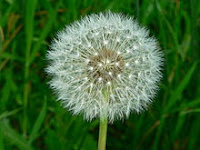Dandelion (Taraxacum officinale, Hindi: Dudhali):
Dandelion (Taraxacum officinale, Hindi:
Dudhali Kanphul, Blowball, Sanskrit: Simhadanti ):
The humble Dandelion is frequently uprooted by the
farmer as a weed and a pest, yet its effect on the soil is beneficial. The
dandelion is a valuable plant as a nutrient accumulator, soil builder and space
holder. As children we could instinctively distinguish it from the other
weeds. We would chew up the tender
leaves simply because they made us feel good after eating. Children have a
natural instinct of what is good for them if they are growing up in a natural
environment.
 The smiling, sunny flowers would invite us with
hidden stories. We would float the flowers in water, in hand made mud or glass
bowls, warm them in the sun, and drink the distillate. The flowers then went
for decorating our mud houses. Much later I read about dandelion flowers wine
which was common in Western countries
The smiling, sunny flowers would invite us with
hidden stories. We would float the flowers in water, in hand made mud or glass
bowls, warm them in the sun, and drink the distillate. The flowers then went
for decorating our mud houses. Much later I read about dandelion flowers wine
which was common in Western countries
And when the flowers dried into millions of stars!
That was a wonderful sport; you blow on it and watch them float like fairies in
the air. The last one invites a wish or a test for a friend, she likes me, she
likes me not. On turning them into fairy clocks and tell the time by the number
of seeds left after blowing.
When visiting France, we were fortunate to
experience the visual treat of entire hills lighting up with yellow dandelion
flowers. There they call it ‘Piss on lit’, literally meaning piss on the bed. Very
apt since the entire plant is a powerful diuretic. In fact the name dandelion
has come from the French word ‘Dent de Lion’- Tooth of the lion. But they do
not pluck from the hill sides, since in France; harmful germs that can be
carried by wild animals are dreaded vampires. Luckily we visited a potter who
lived at the edge of a forest far away from anywhere and they did pluck the
leaves to add to salad.
Uses:
All parts of plants are useful: roots, flowers and
leaves as decoction
a) Root as dandelion coffee is a powerful detox.
b) Leaves are very rich in Vitamin C as salad.
c) Whole plant is a powerful diuretic, detox, liver, kidney,
swelling, skin, stomach and digestive remedy.
d) Excellent for Arthritis, particularly rheumatoid arthritis (decoction
of roots and leaves, one glass morning and evening).
e) Shredded root boiled in water and 1 cup of decoction is
excellent for diabetes.
^Footnote - The Dandelion’s wide spreading
roots loosen hard packed soil, aerate the earth and help reduce erosion. The
deep tap root pulls nutrients e.g. calcium from deep in the soil and makes them
available to other plant soil around the dandelion .The nutrients are also
stored in the leaves. Dried falling leaves and the roots enrich the soil. The
root should be harvested when the plants start drawing back all the nutrients
of the leaves and whole plant to the roots. It is liked by earthworm as this
plant is a natural hummus producer, the soil where dandelion tend to grow is
generally healthy and fertile but tends to be acidic. To improve the Ph
balance, it is advised to add a little lime or wood ash to the soil.

.jpeg)
Comments
Post a Comment